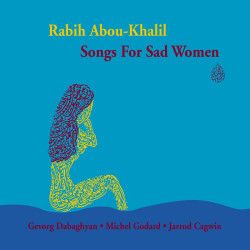- Nowy








Polityka prywatności

Zasady dostawy

Zasady reklamacji
Ethno Jazz / Middle East
premiera polska: 2024-03-01
kraj: Liban
opakowanie: Digipackowe etui
opis:
Editor's Info:
Rabih Abou-Khalil grew up in Beirut and moved to Munich, Germany during the civil war in 1978. From early on, he learnt to play the oud, a fretless string instrument, similar to the European lute or Greek bouzouki. He studied in the Beirut conservatory from oud virtuoso Georges Farah. After moving to Germany, he studied classical flute at the Academy of Music in Munich under Walther Theurer. He has often blended traditional Arab music with jazz, and has earned praise such as "a world musician years before the phrase became a label, he makes the hot, staccato Middle Eastern flavour and the seamless grooves of jazz mingle as if they were always meant to" (John Fordham, Guardian 2002). He helped highlight the oud as a vehicle of eclectic "world jazz". Abou-Khalil and his associates are arguably creating a new international platform for improvised music, comparable to John McLaughlin and his associates in Shakti. Humor is a very important ingredient in Abou-Khalil's art and live performances. Various compositions are inspired by humorous stories, common to many is the absurdity of "commuting between cultures". Rabih Abou-Khalil's CDs are conspicuous for their high quality covers depicting Arabic art. -- (Excerpts from Wikipedia, online encyclopaedia)
Abou-Khalil's new album "Songs For Sad Women" radiates with charming, elegiac beauty. Consisting of four players -- on oud (Arab lute), on duduk (Armenian shawm), on serpent (a mysterious brass instrument from the Middle Ages) and drums --, the band's rather singular instrumental mixture makes for an extraordinary sound experience. This is Abou-Khalil's most emotional music to date, heart-gripping, relaxed and haunting. The album's guest star is Gevorg Dabaghyan, one of the most famous players of the duduk, Armenia's traditional oboe and national symbol. Born in 1965 in Yerevan, Dabaghyan graduated from State Conservatory in 1989 and was the first to present Armenian mediaeval spiritual music on the duduk. He became famous for his cross-cultural collaborations with such as Jan Garbarek, Gidon Kremer and Yo-Yo Ma and his Silk Road Project. In Dabaghyan's hand, the duduk becomes an autumn breeze, fresh and bright. Like a rainbow in the sky, like an eternal voice coming from the mountains and rivers of Armenia, the sound of the duduk touches the listener's heart and soul.
muzycy:
Rabih Abou-Khalil oud
Gevorg Dabaghyan - duduk
Michel Godard - serpent
Jarrod Cagwin - drums
utwory:
1. Mourir Pour Ton Dècolletè 07:34
2. How Can We Dance If I Cannot Waltz 07:03
3. Best If You Dressed Less 07:09
4. The Sad Women of Qana 08:50
5. Para O Teu Bumbum 06:55
6. Le Train Bleu 06:58
7. A Chocolate Love Affair 11:18
wydano: December 14, 2021
more info: www.enjarecords.de
more info2: www.rabihaboukhalil.com
Opis